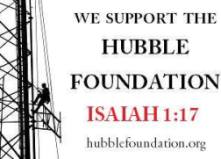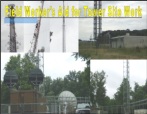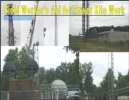Podcast: Play in new window | Download | Embed
Subscribe: Apple Podcasts | RSS
Part 2 – I had to break it down to prevent this from becoming a book.
While at the meeting they covered several topics. For those of you who missed it
Full Video replay here! Just remember that it is over 200 minutes!
More in-depth information is on the podcast! Search on iTunes for Wade4wireless and write a review now!
Topics covered:
- Lowest bidder wins, even if they have to cross 3 states to do the work. So many times a tower crew will pass the local crew to do a job. We can’t figure out why one crew can do something for less with the same equipment but traveling farther to do it. What are they not spending money on? Could it be safety gear and training? We really can’t figure that out.
- Tower workers are often away from home for 1 to many weeks at one time during a deployment. This job wears people down, affects their family life and their attitudes. It can cause depression and anger issues. Family stress causes so many problems with people. When you are trying to support your family and they resent you for being away, it becomes a painful conundrum.
- Deployment speeds are making a difference, crews struggle to keep up with the rate that deployments are moving. Wally brought up that every time he would be on the phone with a foreman/PM/customer they would always end with, “You will be done today, right?” This goes without saying when you look at Kathy Pierce’s story about her some Chad Weller who was ordered to climb in a harness that didn’t fit. Dangerous conditions and wrong equipment make for a disastrous result. Here you have attitudes and deadline that pressure people to make poor decisions. Gette mentioned how many people wanted to refuse to climb but when their paycheck was dangled over their head because the customer/foreman would say they would just find someone else and it would be the last job you would do, climbers feel the pressure to do it. Most times things turn out OK, what about when they don’t? It usually ends badly and then all you have is fingers pointing, OSHA investigating, and lawyers hushing everyone.
- Workers and contractors not getting paid. Just because the lowest bidder wins doesn’t mean that the crew will get paid. This is all too common in the industry. Many people are just not paying an agreed to price. This corruption in the industry must stop. It is not only affecting the well-being of the workers, the crews, the safety of people, but causes most people to look at the tower industry with a despicable taste in their mouth. This was one thing that Liz Day brought up, that the other biggest complaint in the industry was not getting paid. The problem with this complaint is proving it. Not many people hiring subs will want to open their books!
- Layers upon layers of contractors. Why is it that there can be so many layers of workers between the customer and the actual crew doing the work? This creates problems. Liz Day mentioned that when you search the OSHA database that you never see one death from American Tower, AT&T, nor and large contractor like B&V, because they hire the smaller contractors that pay the price. The larger guys may have their own climbers but mostly for maintenance, not large deployments. What is something bad happens? Then the customer can simply say, the contract says the lowest bidder should be safe. Meanwhile, today they are asking for proof of training and certification, which is a great thing. What about customer safety inspections? That would really help and I believe someone brought that up, either Wally or Craig, can’t remember which one, but they said that AT&T made enough money where they could randomly inspect the work at the site. I will tell you from experience that they inspect the final work with their punch lists. This affects payment, and there is always something that need repaired to delay payment, been there and done that. Final inspection is a key component to getting paid. So in this case the ends will justify the means. When that terrible decapitation happened this year Verizon Wireless stepped in to help with the process because no one else knew what to do. That was the right thing to do. They showed that they care and that they wanted to take action.
- Working on the road really wears on some people. When they spend weeks on the road and it shows how their attitudes become different. Each person responds differently. Some get depressed while others get angry and some people become party animals. Why is this? Well, they didn’t bring this up but think of “Lord of the Flies” by William Golding. Some people become a product of your surroundings meaning if they have a strong leader they will maintain but if the leader is a party animal then peer pressure could play into your actions. Remember that these crews are together, all day and all night. It becomes the family and someone in the crew will be the role model for the younger and more impressionable people. There are exceptions to every rule, but the odds are against most of them.
- This was brought up – Tower climbing is being formalized int he education system. Aiken Technical College received a $2.45 million grant from the Trade Adjustment Assistance Community College and Career Training competitive grant program for the expansion of the College’s nationally unique Tower Installation training program. This program is supported by the DOL and the DOE.
- Commitment – Leaders gave their commitment to helping this cause! Leaders high up like the Honorable Thomas Wheeler of the FCC, Honorable Thomas Perez the Secretary of Labor, Dr David Michaels of OSHA, and Jonathon Adelstein president of PCIA offered to give their full commitment to this cause in full support of Scott Kisling the TIRAP chair to make sure that this program gets wheels! The rubber meets the road and the tires started rolling!
- You – Here is where you can be the engine to insure this program has full success. Members of NATE have the ability to make a difference and support each other. Let’s make sure we monitor the industry! Let’s make this program go forward and offer our support. We can only make a difference if we not only support the program, but each other by caring for what happens a year from not. Compassion is contagious, let’s make sure it spreads throughout the industry, from the climber to the foreman to the crew owners to the project managers to the customers! It will take more than a team effort to make this safe, it will take an industry full of compassion to insure true success, ZERO point ZERO casualties! Do you want to make a difference in this industry, here is your chance! Just say no to unnecessary risks, to dangerous work, to crazy demands. Be realistic and work as a team not only within your company but across the industry. We may be competitors in business but we have the opportunity to stand united. The tower climber can only be strong as an industry. Make a difference and stand for good work ethic, smart working, good ethics, and safe work environments!
Gette’s presentation: http://wireless.fcc.gov/presentations/Concerns_Field.pdf
Wally’s presentation: http://wireless.fcc.gov/presentations/Wally_Reardon_Presentation.pdf
DOL Press Release – http://www.dol.gov/opa/media/press/osha/OSHA20141952.htm
FCC Overview – http://www.fcc.gov/events/workshop-tower-climber-safety-and-injury-protection
http://www.dol.gov/opa/media/press/osha/OSHA20141952.htm
http://www.fcc.gov/blog/safety-and-broadband-must-go-hand-hand
http://social.dol.gov/blog/safety-and-broadband-must-go-hand-in-hand/
http://www.fhnfuneralhome.com/obituaries/Chad-Weller/#!/Obituary
Soon I will release my training for the SOW and more, to build your library of basic knowledge so you can advance in your job and the industry! My books will help teach someone the basics of tower work.
Kindle:
PDF books so you can buy with PayPal:
PDF books you can pay with Credit Card:











